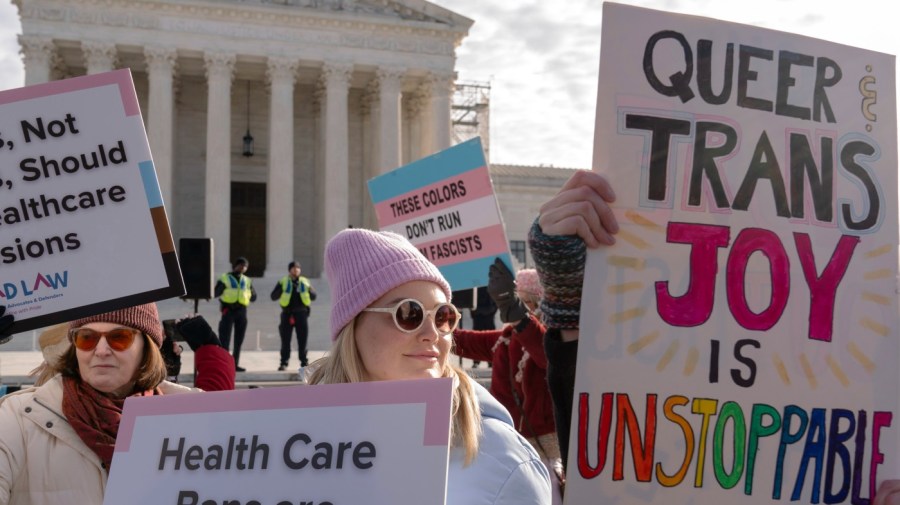The Supreme Court’s conservatives appeared to lean toward upholding Tennessee’s ban on gender-affirming care for minors in a blockbuster showdown over transgender rights Wednesday.
Over 2 1/2 hours of arguments, several conservative justices questioned the Biden administration’s assertion of “overwhelming” evidence that the benefits of giving some adolescents experiencing gender dysphoria puberty blockers and hormone treatments outweigh the risks.
“I wonder if you would like to stand by this statement, or if you think it would now be appropriate to modify that and withdraw the statement,” said Justice Samuel Alito, repeatedly referencing several European countries that have recently moved to restrict some gender-affirming care
“If it’s evolving like that and changing, and England is pulling back and Sweden is pulling back, it strikes me as a pretty heavy yellow light, if not red light, for this court to come in, the nine of us, and constitutionalize the whole area,” Justice Brett Kavanaugh similarly noted.
Tennessee’s law, S.B. 1, prohibits medical providers from administering puberty blockers or hormone treatments for the purpose of enabling a transgender minor to live consistent with their gender identity. The law also bans gender-affirming surgeries, though that provision is not at issue before the high court. Providers who violate the law can face $25,000 civil fines.
The administration’s challenge of Tennessee’s restrictions stands to impact similar laws passed in roughly half the country, setting up a high-stakes battle that has attracted national attention and demonstrations outside the courthouse Wednesday.
The dispute comes as Republicans increasingly lean into anti-transgender messaging, with millions spent on related campaign ads this cycle and a blitz of recent legislation restricting the bathrooms transgender Americans use, sports teams they join and medical care they receive.
At the heart of the current battle is what level of scrutiny the law should receive.
The Biden administration asserts Tennessee’s ban should be treated as a form of sex discrimination. For decades, the court has subjected such cases to “intermediate scrutiny,” which requires the government to show the law is substantially related to an important interest.
“S.B. 1 regulates by drawing sex-based lines and declares that those lines are designed to encourage minors to appreciate their sex,” U.S. Solicitor General Elizabeth Prelogar said.
Tennessee said its law classifies by medical purpose, not sex, so it only needs to clear a lower level of scrutiny, known as “rational-basis review.”
“Just as using morphine to manage pain differs from using it to assist suicide, using hormones and puberty blockers to address a physical condition is far different from using it to address psychological distress associated with one’s body,” Tennessee Solicitor General J. Matthew Rice began his argument.
“Why isn’t this simply a case of age classification?” conservative Justice Clarence Thomas pressed the government, sympathizing with Tennessee’s position.
LGBTQ advocates are holding out hope for a repeat surprise victory at the conservative-majority Supreme Court after Justice Neil Gorsuch, President-elect Trump’s first appointee, wrote the court’s majority opinion in 2020 ruling that an employer firing someone based on their sexual orientation or gender identity violates Title VII of the Civil Rights Act of 1964.
The Biden administration insists the same reasoning applies to the Equal Protection Clause and Tennessee’s gender-affirming care ban should be invalidated.
But during Wednesday’s arguments, Gorsuch didn’t ask a single question. He spent most of the time reading documents or holding a pen to his chin as he listened to the attorneys.
The court’s liberals, meanwhile, sympathized with the Biden administration’s citation of major medical organizations that consider gender-affirming care safe and medically necessary.
“The evidence is very clear that there are some children who actually need this treatment, isn’t there,” Justice Sonia Sotomayor said.
The Justice Department is challenging the law, alongside three transgender adolescents in the state, their parents and a Tennessee doctor who treats gender dysphoria.
The case’s high stakes have attracted significant attention, with dozens of outside groups filing briefs backing each side.
The Justice Department’s challenge drew support from Democratic attorneys general in 19 states and Washington, D.C.; various LGBTQ advocacy groups; 164 Democratic lawmakers; Rep.-elect Sarah McBride (D-Del.), who is set to become the first openly transgender member of Congress; actor Elliot Page; and the American Bar Association.
Tennessee officials are backed by 25 Republican state attorneys general; various conservative legal groups; the United States Conference of Catholic Bishops; and dozens of athletes who oppose against transgender women competing in women’s competition, including former swimmer Riley Gaines and former tennis star Martina Navratilova.
Competing rallies — one organized by conservative organizations including the Alliance Defending Freedom and Do No Harm, and one held by the American Civil Liberties Union and Lambda Legal — drew upward of 1,000 people outside the court Wednesday.
“There’s a really strong precedent that the state has an important role to protect children from harm, and I think that’s exactly what Tennessee’s law does,” said Hannah Daniel, director of public policy at the Ethics and Religious Liberty Commission, the public policy arm of the Southern Baptist Convention. “I’m hopeful that the justices will see that as well.”
“I’m all for supporting kids, providing them with the therapy and the treatment they need, but not this kind of irreversible drug,” said Laura Hanford, a consultant and visiting fellow at the Heritage Foundation, a conservative think tank in Washington. Hanford, of Fairfax, Va., said she has been advocating against gender identity protections since 2015, when her local school board approved adding information about transgender people to its sex education curriculum.
“The encouraging thing now is a lot more people are aware of the issue,” Hanford said, gesturing to the growing throng of people gathered outside the court.
Transgender rights advocates waved Pride flags and held signs encouraging lawmakers and the justices inside the court to protect access to gender-affirming care, which major medical associations say can be lifesaving.
One attendee from Alliance, Ohio, carried an 18-foot flagpole with him as he wove through the crowd. A progress Pride flag, a redesign of the classic rainbow flag representing the movement, and an American flag billowed over onlookers’ heads.
“This belongs to every American of every imaginable identity,” he said of the U.S. flag, “and it’s time we took it back and use it to represent freedom and equality for everybody.”
Daniel Trujillo, a transgender teenager from Arizona, came to the Supreme Court with his mother, Lizette, to rally in support of gender-affirming care for trans youth. When the Supreme Court hands down its ruling this summer, Daniel Trujillo will have already turned 18, meaning his access to care, for now, will not be impacted.
“I know what it’s like and how important it’s been for me to receive gender-affirming care, and I know how positively it has impacted my life. I know that without it, life would have been a lot harder. I really don’t want that for my friends and my family. I care about my people.”
Actor Annette Bening, who also attended the rally organized by the ACLU, called transgender rights “the civil rights issue of our time.”
“Our trans kid and all trans folks need to be seen and heard,” said Bening, whose son, Stephen, came out as transgender as a teenager.
Following Wednesday’s arguments, ACLU attorney Chase Strangio, just after becoming the first openly transgender person to argue before the Supreme Court, encouraged transgender youths and their families to hold out hope that the justices will rule on their side, but said the community and its allies will continue to defend trans rights even if the court decides to uphold Tennessee’s law.
“Our fight for justice did not begin today,” he said. “It will not end in June, whenever the court decides.”
“I know the months ahead and the years ahead are terrifying. I know that we have been the subject of relentless and unjustified attacks,” Strangio said, referring to promises by the incoming Trump administration that threaten to roll back transgender rights. “We are in it together. I love being trans, I love being with you and we are going to take care of each other.”
A decision in the case, United States v. Skrmetti, is expected by summer.
Updated 3:26 p.m.

